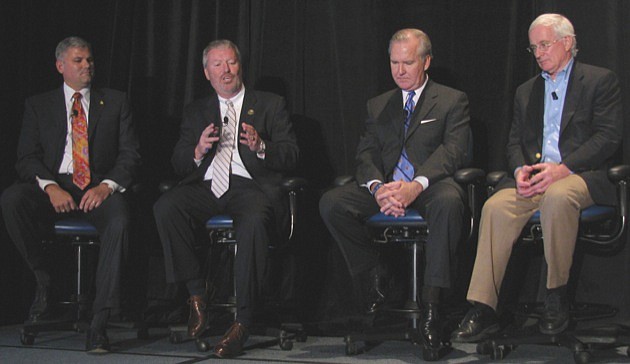- November 26, 2024
-
-
Loading

Loading

Tampa Bay and Central Florida leaders need to make bold, brave decisions to drive the future of what will eventually become a mega-region, by focusing on the next 20 years instead of recent history.
That was the message from mayors of three cities during the Super Regional Leadership Conference April 29 at the Tampa Convention Center. The daylong event, hosted by the Tampa Bay Partnership and Central Florida Partnership, was attended by more than 400 business executives and interested parties.
The agenda was highlighted by a panel discussion featuring three of the region's mayors — Frank Hibbard of Clearwater, Buddy Dyer of Orlando and newly elected Bob Buckhorn of Tampa.
“Folks, we've got to take some risks,” Hibbard told the audience, noting that the larger region's leadership needs the right foresight and guts to follow through on tough decisions. His remarks brought the day's biggest round of applause.
Hibbard offered as an example Clearwater's decision several years ago to remove parking directly on the beach to dedicated lots where visitors pay by the hour. The move initially met with strong resistance but is now widely accepted.
The same could happen for efforts to add light rail to cities as a new transportation alternative that would theoretically spur job growth and development, plus reduce residents' dependence on cars. This can be done on a local level without the proposed federally funded high-speed rail line linking Tampa and Orlando that was scuttled by Gov. Rick Scott shortly after he took office.
Buckhorn, who became Tampa's mayor April 1, says he views last year's defeat of a light-rail referendum in his city as a learning opportunity. A referendum on the November ballot to add a penny to Hillsborough County's sales tax for transit improvements was widely defeated.
“We need to recognize we may not win the first time, but we'll keep trying until we do,” Buckhorn says. Tampa remains one of the nation's largest cities without local rail service.
Dyer, who has already overseen major public construction projects such as the new Amway Arena in downtown Orlando, says his city is committed to move forward with local rail without the high-speed connector. “We see the future from where we are,” Dyer says.
All three mayors agreed that local governments along the Interstate 4 corridor need to pull together to compete with larger metropolitan areas across the country in years to come. Part of that effort includes improving transportation infrastructure and pursuing growth industries such as the medical industry.
That message echoed one delivered by former Pittsburgh Mayor Tom Murphy, who joined in their discussion. During his keynote address, he pointed out that the U.S. has 74,000 local governments.
“One of our biggest challenges is that we have lots of democracy,” says Murphy, now a senior resident fellow for the Urban Land Institute. Neighboring cities and counties should pool their resources rather than remain in local competition, he suggests.
The combined super region represents 16 middle counties in Florida with 17 million residents and a collective economic output of $662 billion, making it the nation's ninth-largest economy.
Yet Murphy says that information is lost on the rest of the country, which largely considers Disney World the region's chief resource. He emphasized addressing the broader area's infrastructure needs such as transportation and housing to plan for the next 20 years, including an anticipated influx of younger workers and immigrants.
Rather than touting higher taxes as the answer, Murphy mentions greater business participation. For example, Pittsburgh-based companies put up $100 million to fund college scholarships for high school graduates with a B average or better, he says.
Technology education will be key to building the new economy, he adds, saying technology today will bring about societal change the way the automobile did.
Murphy also criticizes efforts to cut funding for education at a time when the economic recovery needs it most. He concluded by urging local leaders to keep looking ahead instead of dwelling on history, saying, “The challenge is to reach for excellence.”